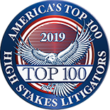The top rated Joe Griffith is one of the leading attorneys in the legal fields of environmental crimes and white collar criminal defense. Joseph P. Griffith, Jr. is designated as an AV rated lawyer by the prestigious Martindale-Hubbell's attorney rating company, signifying the highest possible ranking for legal ability and ethics as judged by peers in the legal profession. JGLF is dedicated to providing outstanding legal service to each of its clients and will fight to protect them to the fullest extent allowable under the law. Client satisfaction is the law firm's number one goal.
White collar crimes are serious offenses in South Carolina and throughout the United States. An environmental criminal conviction can have severe consequences for any person or company. If you or your company are under investigation for, or have been indicted or otherwise charged with, an environmental crime, you should immediately contact the Joe Griffith Law Firm for a free consultation.
Although environmental criminal statutes have existed since the 1800's, environmental criminal prosecutions were not very common until the 1980's. During that time period, the U.S. Environmental Protection Agency ('EPA') created a criminal enforcement office, the U.S. Department of Justice ("DOJ") established an environmental crimes unit, and several federal environmental crimes became reclassified as felonies. As a result of these developments, in conjunction with the American public's increasing awareness of the importance of preserving the environment, the number of environmental criminal prosecutions has dramatically increased on both the federal and state levels. This increased emphasis on environmental criminal enforcement by prosecutors has drastically upped the stakes for those businesses, industries, and individuals whose activities affect the environment.
The prime players involved in the criminal enforcement of federal environmental laws are the 94 U.S. Attorney's offices, DOJ's Environmental Crimes Section ('ECS') of the Environmental and Natural Resource Division ('ENRD'), EPA, U.S. Corps of Engineers ('Corps'), U.S. Fish and Wildlife Department and Federal Bureau of Investigations ("FBI"). The EPA has an Office of Criminal Enforcement ('OCE') and the Corps has a Criminal Investigation Division ('CID') which specifically investigates criminal violations of federal environmental laws.
The U.S. DOJ's Justice Manual, at Section 5-11, sets forth the basic policies for the enforcement of federal environmental crimes by the DOJ. The U.S. Attorney's Office is primarily responsible for criminal enforcement of federal environmental statutes, except for a case of national interest, in which event the case is handled jointly between the U.S. Attorney's Office and ECS. ECS may initiate and handle an environmental case with notice to and approval of the U.S. Attorney's Office.
Prosecutions initiated pursuant to the following statutes are deemed to be federal environmental crimes:
- 7 USC § 136-136y Federal Insecticide, Fungicide and Rodenticide Act ('FIFRA')
- 15 USC § 791-798 Energy Supply and Environmental Coordination Act
- 15 USC § 2601-2692 Toxic Substances Control Act ("TSCA")
- 30 USC § 1201-1328 Surface Mining Control and Reclamation Act
- 33 USC § 401-454 Rivers and Harbors Appropriation Act ('RHA'), Refuse Act
- 33 USC § 1251-1387 Federal Water Pollution Control Act (also known as the Clean Water Act ('CWA') and including the Ocean Pollution Act ('OPA'))
- 33 USC § 1401-1445 Marine Protection Research and Sanctuaries Act (also known as the Ocean Dumping Act ('ODA'))
- 33 USC § 1501-1524 Deepwater Port Act
- 33 USC § 1901-1912 Act To Prevent Pollution From Ships
- 42 USC § 300f-300j-26 Safe Drinking Water Act ("SDWA")
- 42 USC § 2011-2296 Atomic Energy Act
- 42 USC § 4901-4918 Noise Control Act
- 42 USC § 6901-6992k Solid Waste Disposal Act (including, in Subchapter III, The Resource Conservation and Recovery Act ('RCRA'))
- 42 USC § 7401-7671q Clean Air Act ('CAA')
- 42 USC § 9601-9675 Comprehensive Environmental Response, Compensation & Liability Act ('CERCLA')
- 42 USC § 11001-11050 Emergency Planning and Community Right To Know Act ("EPCRA") (also known as "SARA Title III")
- 43 USC § 1331-1356 Outer Continental Shelf Lands Act
- 49 USC § 5101-5127 Federal Hazardous Materials Transportation Statute
Other federal criminal statutes which are also utilized in federal environmental prosecutions are:
| Aiding and abetting False claims Conspiracy Theft or conversion of public property or money False statement Mail Fraud Wire Fraud Obstruction of administrative proceedings Perjury |
Those involved in the criminal enforcement of state environmental laws in South Carolina include the S.C. Attorney General's Office, the S.C. Department of Health and Environmental Control ('DHEC'), the S.C. Law Enforcement Division ('SLED'), the Department of Natural Resources and the Circuit Solicitors.
The State of South Carolina has enacted many environmental criminal statutes which complement federal laws. Some of the more prominent South Carolina statutes are:
| Hazardous Waste Management Act Safe Drinking Water Act Coastal Tidelands and Wetlands Act Pollution Control Act Solid Waste Policy and Management Act Underground Petroleum Environmental Response Act Infectious Waste Management Act Littering |
Federal, state and local agencies and public officials often coordinate their enforcement actions through an environmental task force. A memorandum of understanding is typically executed by the foregoing parties to create such a task force. In South Carolina, an Environmental Protection and Enforcement Coordinating Committee has been formed to implement the specific coordination of federal, state and local criminal and civil environmental enforcement efforts. This task force tries to best utilize limited law enforcement resources in order to maximize the protection of the environment from those who would do it damage. This task force coordinates the following:
- The identification and detection of violations of environmental laws.
- The identification of the violators.
- A determination of the degree of culpability of the violators.
- When appropriate, the prosecution of those culpable individuals and/or companies.
Many environmental prosecutions involve large companies or corporations, as well as the culpable officers and employees. A corporation has long been subject to criminal prosecution for an unlawful act of one or more of its employees as long as the crime was committed within the scope of the employee's employment and with the intent to benefit the corporation. Generally, a corporation may be held criminally liable for unlawful acts of both high-level and low-level employees.
Likewise, corporate officers are no longer immune from criminal prosecutions. Under the "responsible corporate official" doctrine, corporate officers and upper management employees may be held criminally liable even though they did not personally participate in the unlawful activity. This theory of criminal liability may attach when the responsible corporate officer has purposely sheltered himself from illegal acts which occur within the scope of his authority. It is basically an extension of the "willful blindness" theory of criminal liability. Obviously, if a corporate officer knowingly authorizes or directly participates in the unlawful activity, or indirectly participates in such activity as a conspirator or aider-abettor, criminal liability may attach.
The DOJ's Justice Manual, beginning at Section 9-27, entitled "Principles of Federal Prosecution," sets forth guidelines for prosecutors considering a federal prosecution. These guidelines are an attempt by the government to establish a uniform approach to federal prosecutions, with the aim of providing fair and equal treatment, while maintaining a degree of flexibility in assessing factors which influence the decision to prosecute or not. In general, if a prosecutor believes a federal crime has been committed and there is sufficient evidence to support a conviction, a prosecution should be pursued unless no "substantial federal interest" would be served by pursuing a prosecution, the person is subject to effective prosecution in another jurisdiction, or an adequate non-criminal alternative to prosecution exists. The factors to be considered in determining whether a potential prosecution should be pursued or declined include:
|
|
The above Principles of Federal Prosecution are primarily focused upon an individual target as opposed to a putative corporate defendant. On December 12, 2006, Deputy Attorney General Paul J. McNulty issued a Department of Justice ("DOJ") memorandum entitled "Principles of Federal Prosecution of Business Organizations" (the "McNulty Memo") as a supplement to those principles of federal prosecution set forth in the DOJ's Justice Manual. The McNulty Memo supersedes two prior memorandums addressing the subject of corporate prosecutions. Deputy Attorney General Larry D. Thompson's memorandum, dated January 20, 2003, was also entitled "Principles of Federal Prosecution of Business Organizations" (the "Thompson Memo"). Associate Attorney General Robert D. McCallum, Jr.'s memorandum, dated October 21, 2005, was entitled "Waiver of Corporate Attorney-Client and Work Product Protections" ( the "McCallum Memo").
The McNulty Memo generally provides that prosecutors should apply the same factors in determining whether to charge a corporation as they do with respect to individuals, and should weigh all of the factors normally considered in the sound exercise of prosecutorial judgment regarding the same. However, because of the nature of the "corporate person," additional factors should be considered when conducting an investigation, determining whether to bring charges, and negotiating plea agreements. The McNulty Memo provides that prosecutors should consider the following factors in reaching a decision as to the proper treatment of a corporate target:
- the nature and seriousness of the offense, including the risk of harm to the public, and applicable policies and priorities, if any, governing the prosecution of corporations for particular categories of crime;
- the pervasiveness of wrongdoing within the corporation, including the complicity in, or condonation of, the wrongdoing by corporate management;
- the corporation's history of similar conduct, including prior criminal, civil, and regulatory enforcement actions against it;
- the corporation's timely and voluntary disclosure of wrongdoing and its willingness to cooperate in the investigation of its agents;
- the existence and adequacy of the corporation's pre-existing compliance program;
- the corporation's remedial actions, including any efforts to implement an effective corporate compliance program or to improve an existing one, to replace responsible management, to discipline or terminate wrongdoers, to pay restitution, and to cooperate with the relevant government agencies;
- collateral consequences, including disproportionate harm to shareholders, pension holders and employees not proven personally culpable and impact on the public arising from the prosecution;
- the adequacy of the prosecution of individuals responsible for the corporation's malfeasance; and,
- the adequacy of remedies such as civil or regulatory enforcement actions.
DOJ policy shifts announced in the McNulty Memo were significant in two respects. First, federal prosecutors must now obtain written approval before seeking a waiver of the attorney-client privilege and work product protection. Prosecutors must first establish a legitimate need for privileged information, and then must seek approval before they can request it. When federal prosecutors seek privileged attorney-client communications or legal advice from a company, the U.S. Attorney must obtain written approval from the Deputy Attorney General. When prosecutors seek privileged factual information from a company, such as facts uncovered in a company's internal investigation of corporate misconduct, prosecutors must seek the approval of their U.S. Attorney. The U.S. Attorney must then consult with the Assistant Attorney General of the Criminal Division before approving these requests. Attorney-client communications should be sought by prosecutors only in rare circumstances, and if a corporation chooses not to provide attorney-client communications after the government makes the request, prosecutors have been directed not to consider that declination against the corporation in their charging decisions. Second, prosecutors generally may not consider a corporation's payment of legal fees to employees in determining a company's cooperation, except in rare circumstances when it can be shown that such fees, combined with other significant facts, were part of a deliberate design to impede the government's investigation.
In addition, on July 1, 1991, the DOJ issued a memorandum entitled "Factors In Decisions On Criminal Prosecutions For Environmental Violations In The Context Of Significant Voluntary Compliance Or Disclosure Efforts By The Violator" ("DOJ Environmental Guidelines"). This memorandum sets forth guidelines for assessing potential criminal environmental prosecutions in light of self-auditing, self-policing and voluntary disclosure of environmental violations by a putative defendant. The introduction to the DOJ Environmental Guidelines sets forth their purpose and parameters, and provides, in part:
This document is intended to describe the factors that the Department of Justice considers in deciding whether to bring a criminal prosecution for a violation of an environmental statute, so that such prosecutions do not create a disincentive to or undermine the goal of encouraging critical self-auditing, self-policing, and voluntary disclosure. It is designed to give federal prosecutors direction concerning the exercise of prosecutorial discretion in environmental criminal cases and to ensure that such discretion is exercised consistently nationwide. It is also intended to give the regulated community a sense of how the federal government exercises its criminal prosecutorial discretion with respect to such factors as the defendant's voluntary disclosure of violations, cooperation with the government in investigating the violations, use of environmental audits and other procedures to ensure compliance with all applicable environmental laws and regulations, and use of measures to remedy expeditiously and completely any violations and the harms caused thereby.
This guidance and the examples contained herein provide a framework for the determination of whether a particular case presents the type of circumstances in which lenience would be appropriate.
The DOJ Environmental Guidelines set forth the following factors to be considered by a prosecutor in exercising his or her prosecutorial discretion in whether or not to criminally prosecute an environmental case:
- Voluntary Disclosure. Consideration should be given as to whether a person has made a voluntary, timely and complete disclosure of the matter under investigation. The promptness of the disclosure after discovery of noncompliance, the quality and quantity of the information provided, whether the disclosure substantially aided law enforcement, and whether the disclosure occurred before a government investigation began, are all factors for consideration.
- Cooperation. The degree, timeliness and completeness of the information provided should be considered, including the person's willingness to make all relevant information available to the government. Relevant information includes the complete results of any internal or external investigations and the names of potential witnesses.
- Preventive Measures and Compliance Programs. The existence and scope of any regularized, intensive, and comprehensive environmental compliance program should be considered, including environmental compliance or management audits. Consideration should be given to whether compliance or audit programs were adopted in good faith in a timely manner, and whether they include sufficient measures to identify and prevent future noncompliance.
- Pervasiveness of Noncompliance. Systemic or repeated participation in criminal behavior or the lack of a meaningful compliance program should be considered, as well as the number and level of employees participating in the unlawful activities and the obviousness, seriousness, duration, history, and frequency of noncompliance.
- Internal Disciplinary Action. A meaningful internal employee disciplinary program, which effectively disciplines employees who commit environmental violations, should be given consideration.
- Subsequent Compliance Efforts. Prompt and complete remedial actions for any ongoing noncompliance, including the removal of the source of noncompliance, and good faith efforts to reach compliance agreements with local, state and federal authorities, should be considered.
Thus, given the principles of federal prosecution set forth in the U.S. DOJ's Justice Manual, the McNulty Memo and the DOJ Environmental Guidelines, great care must be taken in defending the corporate client which becomes subjected to an environmental criminal investigation or charge. The timing for hiring a criminal defense attorney or law firm is unpredictable. An employee may report being questioned by a federal investigator, a CEO or other officer may be present when a search warrant is about to be executed, or in-house counsel may be served with a grand jury subpoena requesting the production of company documents.
Many tactical decisions must be made which may affect the final outcome of the case. Employees must be advised of their rights in responding to government investigators with care to avoid obstruction of justice, tampering or destroying evidence, or similar types of charges. Oftentimes, companies get in criminal harm's way due to the actions taken in response to an investigation rather than the alleged wrongdoing which jump-started the investigation.
Once criminal defense counsel is retained for the corporation, an assessment will have to be made regarding the need for the company to hire additional, separate counsel for individuals employed by the company who have been, or are likely to be, identified by the government as subjects or targets of the investigation. Ethical conflicts of interest inevitably preclude joint representation of the corporation and targeted employees by one attorney. Such conflicts quickly become apparent. Employers are likely to shun or 'give up' a rogue employee to the government, whereas employees are often approached by the government and asked to testify against, or dime out, the corporate employer.
Corporate counsel must also determine whether or not to execute a joint defense agreement ("JDA") with individual counsel, conduct an internal investigation, initiate a global settlement agreement, voluntarily disclose information to the government, and waive attorney-client, attorney work product, and any self-audit privileges. A written JDA is preferable because it can delineate expectations between the parties, and, in the event of a dispute, provides the court a clear means to resolve any such dispute. However, the courts have recognized the existence of a joint defense privilege even without the existence of a written JDA.
The voluntary disclosure decision is complicated by the mandatory disclosures of violations required by some federal environmental statutes. Corporate counsel must be cognizant of obtaining information which is subject to mandatory disclosure provisions, and should be aware of the benefits of timely voluntary disclosures which may influence the decision to prosecute or mitigate the penalties under the Sentencing Guidelines in the event of a conviction.
Usually, once a potential corporate environmental crime has been discovered, an internal investigation should begin immediately. In publicly traded corporations, oversight for such investigations will usually be assigned to a special committee. It is highly recommended that the corporation obtain separate defense counsel to conduct the investigation. Defense counsel can conduct its investigation under the cloak of attorney-client and work product privileges, as well as any self-evaluation privilege that may be available. All relevant employees should be interviewed, and all pertinent documents gathered and reviewed, with a keen eye for documents, particularly e-mails, which may be subject to attorney-client privilege. If corporate privileges are not going to be waived, a log of privileged documents must be created. Care should be taken to inform the corporation and its employees to not destroy any evidence which is the subject of the investigation. Employees must be told that corporate defense counsel is the corporation's attorney and not the employees' attorney, and that the corporation holds the attorney-client privilege. Employees should be advised of their right to not talk to the corporate or government attorney, and of their right to obtain separate counsel. Counsel should not mislead the employees in any way in order to avoid any obstruction of justice allegations. A second person, such as an investigator or another lawyer, should always attend employees' interviews, and the interviews should only be memorialized in a memorandum by the investigating attorney in order to preserve the privileged status of same. In many cases, the corporate client determines to waive any privileges and fully cooperate with the government in its parallel investigation. Sometimes, the government will agree to limit the scope of any waivers by the corporation. However, counsel should be aware that such partial or limited waivers are not universally recognized by the courts, and may constitute a complete waiver of all such privileged materials.
In defending criminal environmental cases, the practitioner should be aware of potential defenses which may be available. Such possible defenses as acts of God, lack of mens rea, collateral estoppel (administrative findings or civil orders may bind the government to facts which preclude prosecution), double jeopardy (if civil or administrative enforcement has already occurred), equitable estoppel (government inspectors previously approved the now-targeted conduct), mistake in fact (not knowing, for example, that a particular substance is hazardous), lack of fair regulatory notice of criminal conduct (United States v. Pennsylvania Indus. Chemical Corp., 411 U.S. 655 (1973)), and regulatory or statutory exemptions (such as certain recycled materials) may be applicable to your particular case.
Collateral consequences resulting from an environmental criminal conviction can be devastating. Such convictions will usually have a collateral estoppel or res judicata effect on any civil or administrative actions or proceedings which are based upon substantially similar facts as those which supported the conviction. Convicted corporations, partnerships, and individuals may also be subject to federal suspension, debarment or listing notifications or proceedings, which basically preclude the offending party from contracting with the federal government or participating in any government program such as obtaining federal grants, loans, scholarships, subsidies, insurance, guarantees, etc' Being placed on EPA's List of Violating Facilities or General Service Administration's ("GSA") "Lists of Parties Excluded from Federal Procurement or Non-Procurement Programs" usually means the financial death knell for the offending party. An EPA listing based upon a criminal conviction for violation of the Clean Water Act or Clean Air Act is automatic, is effective upon the date of conviction, and requires no hearing or further proceeding.
Parallel civil and/or administrative proceedings may be pursued in addition to environmental criminal prosecutions. Pursuant to the DOJ's Justice Manual, the U.S. Attorney's Office and ECS shall coordinate their efforts under such circumstances. The government may be particularly inclined to seek immediate civil injunctive relief for on-going environmental violations.
Sentencing regarding federal environmental criminal violations is generally governed by Part 2Q of the United States Sentencing Guidelines, which are now advisory pursuant to United States v. Booker, 125 S.Ct. 738 (2005), and the factors set forth in 18 U.S.C. § 3553(a). There are no sentencing guidelines applicable in state court prosecutions of environmental crimes in South Carolina.
EXAMPLES OF FEDERAL AND STATE ENVIRONMENTAL CONVICTIONS
The Joe Griffith Law Firm is a Charleston, SC law firm that concentrates in white collar criminal litigation and environmental crimes. We handle federal and state criminal environmental cases, including, but not limited to, the following:
- Corps and EPA permit violations
- Obstructions placed in U.S. waterways
- Wetlands filling and dumping by developers and land owners
- Oil spills and oil separator violations by maritime vessels
- Ocean dumping of unauthorized materials
- Point source discharges of toxic substances into the air, land and water
- False certifications of environmental reports and manifests
- Wildlife violations
JGLF represents those accused of criminal misdemeanors and/or felonies in a variety of state and federal proceedings including, but not limited to, initial appearances, preliminary hearings, bond hearings, trials, sentencing hearings, parole hearings, probation hearings, and appeals. JGLF represents those designated witnesses, subjects or targets of grand jury criminal investigations, and have the experience to know when to assert 5th Amendment rights, make effective proffer statements, or demand immunity from government prosecutors. Attorney Joe Griffith is extremely effective in conducting pre-indictment investigations to gather and analyze evidence in order to make factual and legal presentations to prosecutors in an effort to persuade them to issue a declination whereby they agree to not indict a person or company under criminal investigation. We have been successful in having investigations declined pre-indictment. In the event of an indictment or other criminal charge, JGLF stands ready to fight for its client and protect his or her legal rights to the fullest extent of the law.
If you or your company have received a subject letter or target letter naming you as a subject or target of an alleged environmental criminal investigation, have been served with a search warrant or grand jury subpoena, or have been charged in a criminal complaint or an indictment with an environmental crime, contact the Joe Griffith Law Firm immediately to discuss your legal rights.









